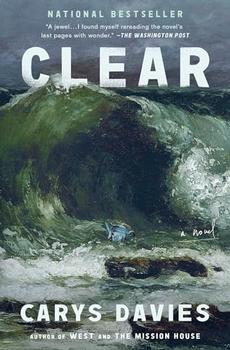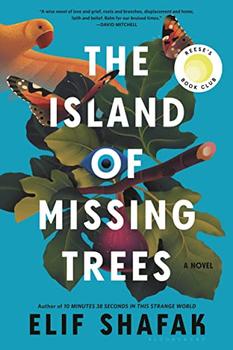Summary | Excerpt | Reading Guide | Reviews | Beyond the book | Read-Alikes | Genres & Themes | Author Bio

A Novel
by Carys DaviesJohn Ferguson is a principled man. But when, in 1843, those principles drive him to break from the established Church of Scotland, the evangelical minister soon finds himself a poor man, too. Stripped of his income, worried how he'll provide for his wife, he puts scruples aside and agrees to a lucrative but dubious mission: to sail north—armed with a pistol—and "clear" Ivar, the last remaining tenant of a forgotten island halfway between Shetland and Norway.
Ivar has lived alone for decades; the Highland Clearances (see Beyond the Book), a series of mass evictions that began a century earlier, have already forced his family from the land. But if Scottish history would have him for another victim, Clear deftly upends the usual narrative. Soon after arrival, John slips on the craggy coastline; Ivar, discovering his unconscious body, takes it upon himself to patch the minister up. In the sudden intimacy of the crofter's bothy (hut)—evoked by Davies with a tenderness as touching as it is unexpected—the difference in the men's power evaporates. They speak no common tongue, but the spark of a connection disarms them both; slowly, as the minister convalesces, each begins to decipher the other, one translated word at a time.
An obsession with language drives this slim yet gripping novel. Ivar speaks Norn, an island relative of Danish and Norwegian on the brink of extinction. To John, it's a language uniquely suited to the unforgiving surroundings; what he would call simply "a rough sea," Ivar terms "skreul," "pulter," or "yog," depending on the peculiarities of the roughness. For the Highlander—who hasn't even set eyes on another human in years—to speak and be understood by John is something close to magic: it "connect[s] their lives in the strongest possible way." Yet as the friendship deepens, so much of Clear's fascination springs from the unspoken. John's mission is never far from his thoughts. The hidden eviction notice, not to mention the pistol to enforce it, lies between the two men like an untranslatable phrase.
Language is an apt theme for an author who wields it so masterfully. Clear's chapters, each a brief, poetic vignette, are lessons in what can be achieved with spare, finely-wrought sentences. Davies is a writer with a painter's sensibility. Like the best landscape paintings, her scenes are precise in their detail and expansive in their scope; and like the best landscape painters, she has a rare sensitivity to the natural world. The prose is exquisitely earthy, her pen clearly at home digging through the peat bogs and limpet-crusted rock pools of the Northern Isles. Rain, when it falls, does so in "big, coarse drops, melting the soil into a soft brown soup"; the cold wind in its wake blows "low over the ground, making the bogs shiver." Beauty is found on every page, and rarely is a word wasted.
Less graceful, however, is the handling of history. Between the Clearances and Church schism, Davies arguably takes on more of the 19th century than her short novel can handle, and it's frustrating to see unwieldy exposition clip the wings of a writer who's already proved herself so majestic in full flight. Some finer points come to feel even more superfluous given the turns Clear takes in its final quarter. Disappointingly, those carefully assembled tensions which made the premise so compelling—how Ivar will react to his eviction and how John will see it through with his soul intact—go slack once the novel starts pulling at other concerns. That's not to say Davies's ending isn't timely or affecting, only that it arrives like the answer to a question never asked.
But these are minor quibbles about Clear's major achievements. With precision and lyricism, Davies has crafted a gentle, poignant drama. Great forces of history may convulse the mainland, but the soul of this beautiful novel curls around the hearth of the island bothy. At its core, Clear is that: two men, alone together, discovering the quiet miracle of human connection.
![]() This review was originally published in The BookBrowse Review in April 2024, and has been updated for the
March 2025 edition.
Click here to go to this issue.
This review was originally published in The BookBrowse Review in April 2024, and has been updated for the
March 2025 edition.
Click here to go to this issue.

If you liked Clear, try these:

by Elif Shafak
Published 2023
A rich, magical new novel on belonging and identity, love and trauma, nature and renewal, from the Booker-shortlisted author of 10 Minutes 38 Seconds in This Strange World.

by Richard Powers
Published 2019
"The best novel ever written about trees, and really just one of the best novels, period."
—Ann Patchett
Your guide toexceptional books
BookBrowse seeks out and recommends the best in contemporary fiction and nonfiction—books that not only engage and entertain but also deepen our understanding of ourselves and the world around us.